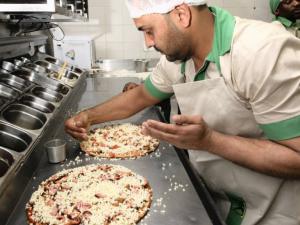 onopoly.
onopoly.Chief executive Kevin Hedderwick said yesterday that Famous Brands, which has a total of 2 136 restaurants, had deliberately segmented these markets to become competitive but was careful about creating dominance in any one category.
“We are mindful of the Competition Commission and that is why we have deliberately traded on one specific food category per brand. We have one pizza brand in which we do not dominate. What we will not do is to have three brands in one food category,” Hedderwick explained.
Famous Brands has recently ventured into the family restaurant market by acquiring two family brands – Europa and Fego Caffé – as well as Turn ‘n Tender steakhouse.
While it holds on to popular brands such as Steers, Debonairs Pizza, Wimpy and Mugg & Bean, Famous Brands says it wants to fill the gap in markets where it is under-represented.
In September last year it adopted the fit-for-purpose model, with the aim to align its outlets with its manufacturing and supply chain operations.
Besides spending millions on restaurant acquisitions, Famous Brands has also invested in manufacturing businesses by spending R7 million on Java Lava beverage manufacturers and subsequently spending another R5m on coffee roasting equipment.
Subsequent to the acquisition, the name of Java Lava was changed to Famous Brands Coffee Company.
In pursuit of a deliberate strategy to build and expand the group’s manufacturing capabilities and leverage opportunities in the supply chain, Famous Brand has concluded three key transactions.
These include the Famous Brands Coffee Company, which will supply all the franchises; Coega Cheese, which will produce mozzarella cheese slices and cheese spread for the group; and The Bread Basket, which will build manufacturing capability in specialist baking production for its outlets.
With rival fast food chains, including KFC, Nando’s and The Fish & Chip Co, heading for rural, township and semi-urban areas, Famous Brands says its does not want to be left behind.
Its main competitor, Taste Holdings, is also in the process of nailing down its manufacturing and supply chain strategy, which will deliver goods to its more than 500 franchise outlets. These include the Scooters, Maxi’s and The Fish & Chip Co brands.
Of the 140 restaurants that Famous Brands opened during its latest financial year, 47 outlets are located in markets where it previously did not trade, such as Katlehong on the East Rand, Dobsonville in Soweto and Butterworth in the Eastern Cape.
Chris Gilmour, an equity analyst at Absa Investments, said previously that Famous Brands would stop buying up small businesses only if these physically ran out.
He said the latest acquisitions were interesting because they gave an indication that the group was filling up the gaps in different portfolios.
He added that the Competition Commission would only say “enough is enough” if Famous Brands sought to acquire businesses like Spur. “There could be an argument that they are starting to get a bigger market share,” he said.
Yesterday Gilmour said that Hedderwick was clear that his company would never buy a company like Spur or the Butcher Shop and Grill because it wanted to be somewhere in the middle.
He disagreed that Famous Brand was a monopoly, saying that the group’s biggest chain was Steers, with a total of 546 restaurants.
However, the biggest brand in the country was KFC, with more than 700 outlets.





